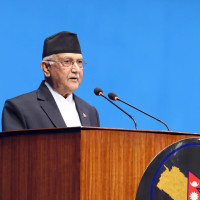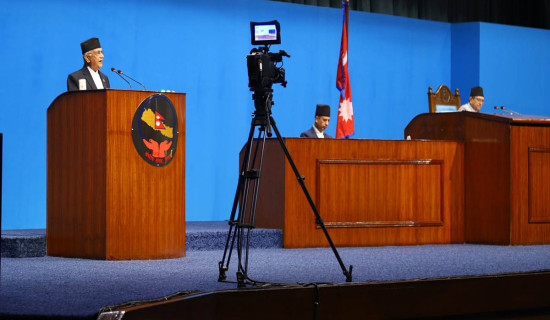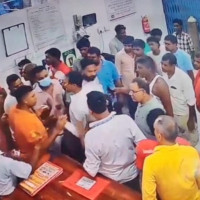- Wednesday, 23 July 2025
Nepal Needs Patriotic Leadership
True leadership must be grounded in unconditional love for the country. A leader aspiring to govern should rise above personal interests and be committed to national development. Unfortunately, the recent return of a former president to active politics signals both a lack of second-generation leadership in party politics and a recurring cycle of power concentration. It also reflects the persistent greed among some politicians who seek to occupy positions of influence indefinitely — within both the party and the state. The practice of appointing former presidents from among major political party leaders may no longer be the best strategy for a maturing republic like Nepal.
Bidya Devi Bhandari has been associated with the CPN-UML since her student days. She rose to national prominence following the tragic and mysterious death of her husband, Madan Bhandari — the then general secretary of UML—in a road accident in 1993. Since then, she steadily climbed the party ranks, eventually becoming vice-chair of UML and later serving as the country’s Defence Minister. Her close alliance with UML leader KP Sharma Oli is widely acknowledged as instrumental in her political ascent and her eventual election as Nepal’s first woman President.
Significant concerns
Upon assuming the presidency — an ostensibly apolitical role — Bhandari was required to relinquish her party membership. Now, after completing two terms as head of state, she has announced her return to active politics by re-joining UML. She has renewed her party membership and given up the perks she is entitled to as a former president, stating her desire to continue serving the country. Her decision has sparked controversy, with Prime Minister KP Sharma Oli himself criticising the move as inappropriate. Bhandari’s re-entry into partisan politics raises significant concerns at a time when Nepal’s political environment remains fragile. It reignites broader conversations around gender, leadership, party culture, and the integrity of constitutional values.
The presidency in Nepal is largely ceremonial. However, during her tenure, Bhandari was frequently criticised for overstepping constitutional boundaries and interfering in executive matters. Her handling of the Citizenship Bill was particularly controversial, especially from a feminist perspective. Many accused her of taking a partisan stance and undermining gender equality by delaying key legislation. Moreover, during the constitutional crisis surrounding the House dissolution in 2020–21, she was widely perceived as acting as a proxy for then Prime Minister Oli, raising questions about her neutrality and judgment.
Nepal’s constitution is progressive in its intent, especially regarding inclusion. It mandates the proportional representation of marginalised communities in governance, based on gender, ethnicity, caste, and religion. Electoral laws require that one of the top two positions in municipalities and wards be held by a woman, and preferably from a disadvantaged community. This has resulted in high numerical representation of women in government. However, decision-making power remains limited, particularly from a feminist standpoint.
Nepal ranked 117th out of 146 countries in the 2023 Global Gender Gap Index published by the World Economic Forum. Despite the visible presence of women in parliament and local governance, true political empowerment continues to lag. As the country’s first female head of state, Bhandari could have championed the elevation of women into influential roles, advocating for their genuine inclusion in decision-making structures. Her return to politics, therefore, raises an important question: what does she bring that is new, and is she returning merely to reinforce the old UML power dynamics?
Rather than leveraging her experience to lead issues of national or international importance — particularly those affecting marginalised groups — her return appears aimed at consolidating party control. Speculation suggests she may seek to reorganise UML, position herself as party Chair, or even aspire to become Prime Minister. That she announced her re-entry on the birth anniversary of her late husband adds another layer of symbolism — perhaps in an attempt to tap into nostalgic sentiment. Yet this approach weakens her potential to be viewed as an independent, transformative feminist figure with a historical legacy.
Public frustration with Nepal’s political leadership has grown steadily since the advent of multiparty democracy. According to a g public trust in key political leaders—including former presidents and prime ministers—has significantly declined. This disillusionment stems from the failure of successive leaders to deliver on promises of reform, inclusion, and development.
Building a legacy
Rather than re-enter partisan politics, Bhandari could have chosen to remain above the fray, using her stature as former President to champion the spirit of inclusion enshrined in the constitution. By doing so, she could have built a legacy as a true statesperson—one who rose above personal ambition to serve the greater good. Civil society, too, should advocate for ending the practice of appointing career politicians to the presidency. Instead, individuals with meaningful contributions to national development — be it in science, literature, social work, or public service — should be considered for this prestigious role.
Leadership is not about holding office; it is about purpose, vision, and integrity. Nepal needs leaders who demonstrate unconditional love for the country, not individuals returning to familiar party corridors in pursuit of power. Bhandari still has the opportunity to define herself beyond her party affiliations — by acting in the national interest, rising above partisanship, and becoming a unifying figure in these critical times.
(Sharma is a senior journalist and women’s rights advocate. namrata1964@yahoo.com or on X @NamrataSharmaP.)





-square-thumb.jpg)




-original-thumb.jpg)





